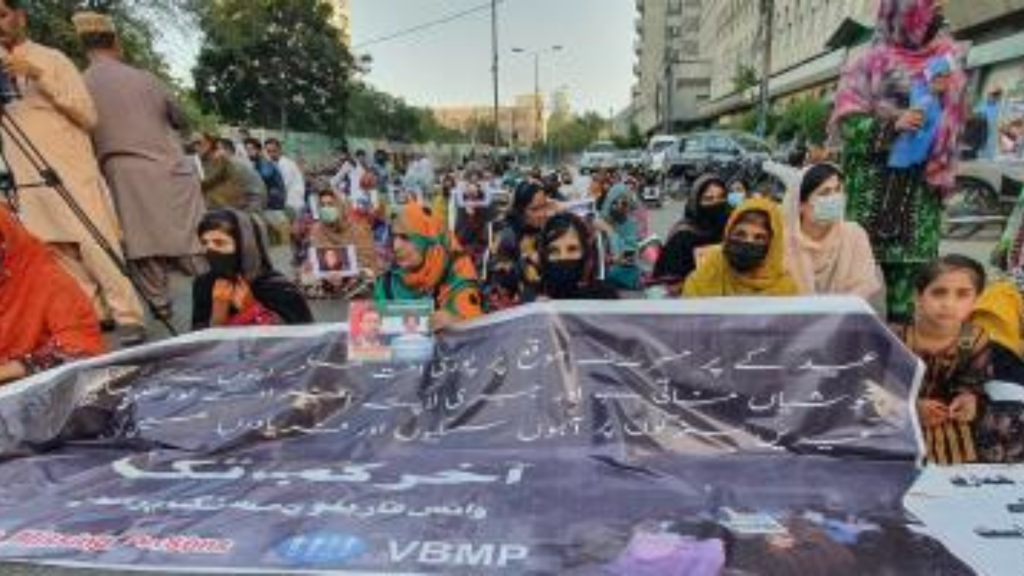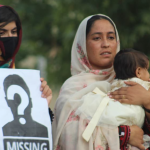Human Rights Council of Balochistan received forty-eight cases of killings, including eleven cases of extrajudicial executions, perpetrated by Pakistan’s paramilitary forces in July. Forty-five cases of involuntary disappearances were recorded in the month.
Systematic killings and enforced disappearances are considered to be the most pervasive state violations against the people in Balochistan, affecting hundreds of thousands of civilians. These crimes are largely carried out by Pakistani security forces and their affiliated militias locally known as death squads. These groups are operating as part of a deliberate and planned strategy often in a sweeping indiscriminate manner to instill maximum terror and fear into the largest possible number of people in Balochistan.
During the month of July, protesting families of the victims of enforced disappearances went through trauma and anguish all-over again as Pakistani security forces massacred 11 people in a fake encounter, labeling them as terrorists of the Baloch Liberation Army (BLA). The forces claimed that they were involved in the kidnapping and murder of lieutenant colonel Laiq Mirza Baig. Though there is no evidence yet to prove these allegations. In the following days, seven of these victims were identified by their families as previously disappeared persons with the help of doctors and the Voice for Baloch Missing Persons (VBMP). The victims were identified as Shams Satakzai, Salim Karim, Dr. Mukhtar, Shehzad Khuda Bakhsh, Shah Bakhsh Marri, Jumma Khan, and Muhammad Khan. After the identification, the families of the victims took the streets in protest saying their loved ones were already in the custody of security forces and demanded a judicial commission to investigate the massacre, assurance that the victims of enforced disappearance would not be extrajudicially killed and provide information about the whereabouts of the disappeared persons. But in retaliation, the police charged the protesting women and children with batons and fired tear gas. The families are on a sit-in protest for the last 19 days in front of Governor and Chief Minister Balochistan house however, their demands have not been accepted yet.
Enforced Disappearances:
In July, Pakistani security forces forcibly disappeared forty-five persons including ten students. Fifteen people were released later while the whereabouts of thirty-five people remain unknown.
Twenty-six people were forcibly disappeared by the Frontier Corps and six by intelligence agencies. Police’s counter-terrorism department abducted six, while five others were abducted by armed men accompanied by CTD.
On 01 July, Forces detained six people from different areas of Sindh and shifted them to an unknown location. The victims were identified as Mitha Naseer, Hameed Musa, Nokap Dur Muhammad, Wadera Dur Mohammad, Ismail Zarak, and Moriya Zarak. All of them were detained from the Jacobabad and Khairpur regions of Sindh.
On 02 July, forces abducted Faisal Hasil from his house in the industrial city of Hub, district Lasbela. According to his family, forces raided their home, took him in custody, and shifted him to an unknown location.
On 05 July, Rangers, a paramilitary force, in a press conference, presented missing Shoaib Azum as a commander of the Balochistan Liberation Front (BLF) and claimed to have arrested him on 04 July from Hawksbay, Karachi but in fact, he was forcibly disappeared by the intelligence agencies during a raid on his house in Bashir Goth area of Gulshan-e-Iqbal, Karachi on 29 April 2022. His family reported his abduction a day later of his disappearance and rejected the claims of rangers in a follow-up press conference.
On 09 July, Frontier Corps accompanied by armed men dressed as civilians raided Qadirabad, an area adjacent to Nushki, in large numbers, and started a house-to-house search operation. In the operation, six people were taken into custody and later disappeared. The victims were identified as Iftikhar Baloch Badal Khan, fourteen-year-old Idris Haji Akbar, fourteen-year-old Bilal Sahib Khan, fifteen-year-old Jalil Sahib Khan, seventeen-year-old Zubair Mir Ahmed, and twenty-year-old Khalid Munir.
On 16, July, forces detained three persons from Shapuk, district Kech. They were identified as Nadil Dilmurad, Qadeer Ali Bakhsh, and Muhammad Hasil. Nadil and Qadeer are residents of Balgater and were visiting their relatives in Shapuk. All three were shifted to an unknown.
On 18 July, the Police Counter Terrorism Department (CTD) claimed in a press release to have arrested and confiscated arms and explosives from Ghous Bakhsh son of Ali Khan Langani Marri in Hazar Ganji, Quetta. It is further claimed that during an intelligence-based operation the CTD arrested a suspected member of the Baloch Liberation Army. Contrary to the claims of the CTD, Ghous Bakhsh was forcibly disappeared by security forces from the Ghosth area of Shahrag on 09 August 2021. Ghous Bakhsh’s whereabouts remained unknown for the last 11 months.
On 18 July, Muhammad Aslam son of Muhammad Ibrahim Mengal was traveling late in the night when two vehicles of Police CTD personnel stopped his car in district Kharan and whisked him away.
On 18 July, unknown armed men stormed Ali Hasan’s house in the Sunni Hassanabad area of Khuzdar and abducted his son Asadullah. According to the locals of the area, these armed men are affiliated with security forces and commit human rights violations with complete impunity. Asadullah’s whereabouts are unknown since the abduction.
On 19 July, Police CTD forcibly disappeared Ghulam Jilani Hussainzai near the Jama Masjid in Kharan, Balochistan. According to his family, this is not the first time they are subjected to torture by the forces. Over the past decade, security forces have forcibly disappeared many members of his extended family during raids without any reason or explanation.
On 20 July, FC personnel raided the house of Haji Noorullah Sarparah on Saryab road, Quetta, and forcibly disappeared his teenage son Saud Aqib. The family of Haji Noorullah went through the agony of enforced disappearances before as five members of the family, including Saud Aqib, were previously forcibly disappeared. All five members of the family were subsequently given into police custody with fake charges after five months of their disappearances.
On 20 July, CTD accompanied by personnel of intelligence agencies arrested Khalil Ahmed, a resident of Parpeet, Kharan, from his shop in the Kalan area of the district.
On the same day, security forces raided the Kili Kamalo area of Marriabad, Quetta and abducted Bijjar Khan Marri.
On 21 July, the forces raided a house and abducted four men from an internally-displaced family who migrated to Teertej, Awaran after the regular military aggressions on their village. Swali, his two sons Bahot and Naseer, and their cousin Rafeeq were identified as the victims of enforced disappearances during the raid.
On 22 July, security forces detained two cousins, Sudeer Rahim Bakhsh and Naveed Hameed in Tump, district Kech and shifted them to a nearby military camp.
On 23 July, army personnel conducted a raid in the Malishband area of Mashkay, district Awaran which resulted in the enforced disappearances of a woman, a senior citizen, and four others. The abductees were identified as Bibi Gohar Jan, Wali, Yarjan, Saeed, Zareef, and Waleed. The locals of the area were warned by the army to either leave their homes and abandon the area or face forceful military evacuation.
On 24 July, security forces detained Akbar Nawab Khan and Jaisaf Nawab Khan in Dera Murad Jamali and forcibly disappeared them.
On 29 July, Police CTD claimed, in a press release, to have conducted an intelligence-based operation in Shereen Aab road, Mastung, and arrested Rahim Bakhsh Sanjar Khan and Bahawal Khan, residents of Khad Kocha, Mastung. The CTD claimed that the aforementioned persons were affiliated with the Baloch Liberation Army.
On 31 July, the Police Counter-Terrorism Department (CTD) raided the house of Nofal Bugti in Dera Murad Jamali and forcibly disappeared his son Muhammad Rafiq Bugti.
Killings:
July witnessed an increase in the cases of killings as compared to the previous months. Human Rights Council of Balochistan documented forty-eight cases of killings, including five women while fourteen dead bodies remained unidentified.
Twenty-six persons were killed by unknown assailants, seventeen by security forces, four by Baloch militants, and one person died after he was stabbed.
Among the victims, twelve were killed in Quetta, seven in Panjgur, six in Kech, five in Harnai, four in Surab, two in Kalat, two in Kharan, and two in Chagai, and one in Sibi.
Moreover, a rise in the cases of fake encounters and target killings was also noticed during the month, when forces extrajudicially killed eleven people in a fake encounter and labeled them as terrorists. Sixteen people were killed in target killings. two people were killed in a domestic dispute, and a child died due to strangulation. Moreover, six mutilated and two decomposed dead bodies were recovered from different areas.
Jalamb son of Malik Marri, a refugee from Balochistan living in Nimroz, Afghanistan for a decade, was also shot-dead in Nimroz, Afghanistan. According to reports, Afghan authorities arrested three suspects who might be involved in the murder of Jalamb Marri. In the past, Baloch refugees were targeted several times in neighboring countries of Iran and Afghanistan.


